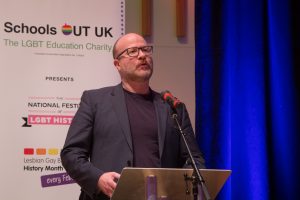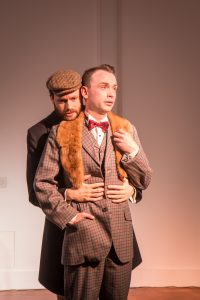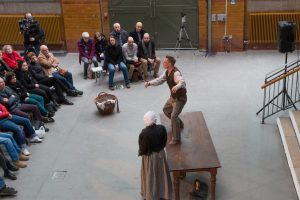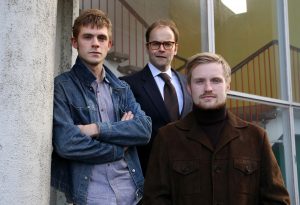
Stephen M Hornby © Nicholas Chinardet
2015 marked the tenth anniversary of LGBT History Month in the UK. Playwright in residence for LGBT HM, Stephen M Hornby, explains how in the years following its 2005 introduction, the initiative “bubbled along nicely as a sort of grassroots happening.” The charity spearheading things, Schools OUT, would “set a theme, tie it in with the school curriculum, and off people went – everyone was free to download the logo and set up their own little events – it was very successful. But for the tenth anniversary Jeff Evans, who had become involved with the organisation, said: ‘We really ought to try and focus this into some sort of festival.’ Evans thought LGBT HM warranted a weekend programme of events. The result was OUTing the Past festival, which he also thought could include a dramatisation of LGBT history. He went to see some of Hornby’s work and then approached him to see if he’d like to dramatise a particular story. He was doing a PhD in the arrests of men for same-sex behaviour and in the process he’d learned of an event in which 47 men were arrested in Hulme, Manchester – the result of a raid on an all-male drag ball. “He’d got all the press reports, this story had spread like wildfire, all across the North West into Yorkshire, right down into London, into the weekend newspapers, then into America.” Evans had also gathered census data of the men arrested, “so we had a really good picture of their lives and what happened to them.” Staged in Manchester as part of the first OUTing the Past, the dramatisation was called A Very Victorian Scandal. It was divided into three pieces running over three days. “We restaged the raid in Via on Canal Street, we did a whole piece at Central Library around what the politics of the police were, and then restaged the trial at People’s History Museum. We could have done it ten times over because it was packed out for each one.”

A Very Victorian Scandal: Pres

Mister Stokes: The Man-Woman of Manchester
The 2016 production was Mister Stokes: The Man-Woman of Manchester. Written by Abi Hynes, it was about a man who drowned in the River Irwell in 1859, and was then found to be biologically female. 2017 marked 50 years since the partial decriminalisation of homosexuality (the Sexual Offences Act 1967). Cue The Burnley Buggers’ Ball. “Burnley became the centre for LGBT rights in the 1970s. In applying the 67 act, one of the things that’s forgotten – and not very easy to talk about – is that often individual police forces disagreed with the decriminalisation and then went to war on the gay community. They upped the raids on venues and purposely tried to destroy the business models by which those businesses existed.” Allan Horsfall had the idea to “bring the police onboard” and set up gay clubs based on the working men’s club model. This led to a public meeting at Burnley Central Library in 1971. “The Campaign for Homosexual Equality in the North West joined forces publicly with the Gay Liberation Front who were based in Islington. The Campaign for Homosexual Equality was nice sensible men in suits trying to get people to sign petitions, the Gay Liberation Front was radical drag, storming meetings and outing themselves in public – two very different approaches to how you campaign. This was one of the only times they came together in public, to try and set up an LGBT+ club in Burnley.”

The Burnley Buggers’ Ball © Nicholas Chinardet
In 2017 Burnley’s Lesbian Liberator was also put on. It told of Mary Winter, a bus driver dismissed from her job for wearing a Lesbian Liberation badge. “She actually stands up and says, ‘No, that isn’t right’, and mobilises people to come and protest with her outside the bus station, which remarkably was just behind Burnley Library. We were able to recreate the events more or less where they’d happened.” Regarding the library, he recalls, the staff there (like Lancashire County Council) “were wonderfully supportive”. There was also a bit of embarrassment on the part of the library staff. “They said, ‘We’d no idea that was the history of this building.’ We’re only talking about the 1970s, and somehow this seminal meeting had been utterly forgotten by the space and the people who work in it; not through anything malicious, just because our history doesn’t get recorded and repeated to people. It brings you home, how absent we are from the historical record.”
Done as a double bill, the Burnley plays were performed four times in Burnley, with a Q&A taking place after each performance. “Often Q&As are essentially the director and actors talking about their process, but in Burnley they became the community processing the history they’d never been told about their own hometown. We had all sorts of marvellous moments in the audience. We had one guy saying, ‘I grew up as a young gay man here, and it was an awful place to grow up, and I feel like you’ve given me back my hometown.’” Another contribution came from a woman whose trans son was having a horrible time at school; Burnley Youth Theatre were also in attendance, they immediately comforted the mother, telling her to send her son to a session with them and that they’d support him. “All this stuff started happening around us that was really about community building and a community processing and understanding itself.”
There wasn’t a production last year (“because we were knackered”) but OUTing the Past 2019 will feature The Adhesion of Love, which will do a small tour across the North West. Set in the 1880s, it’s about a group of working class/lower-middle class men in Bolton who form a reading group. “They meet up on a Monday evening and become really interested in Walt Whitman’s poetry. Two of them manage to make it to America, visit Walt Whitman, keep really detailed diaries and take pictures, and come back with them. So I’ve used those from the archives of two museums to create this account of those visits and what they meant to the men. I’ve put the sexuality back into the story. They absolutely were interested in Walt Whitman’s work, they absolutely valued his environmentalism and view of spirituality and the cosmos, but they also connected to him because of his ability to articulate same-sex attraction.”
In putting these plays on, does he encounter things that suggest LGBT rights haven’t progressed as far as they might have done? “Yeah, all the time.” An example comes from the shows in Burnley, two of the four performances (during a segment that took place outside the library) were interrupted by homophobic abuse from members of the public. The stage manager had done a risk assessment in case of such an occurrence, but Hornby didn’t expect it to happen. “I think it brought us all up really about how much in a city like Manchester, London or Brighton you can have your little gay bubble and feel relatively safe within it, and then as you step outside it, it’s very different.”
He is also playwright in residence for People’s History Museum, for which he has written a play about Peter Tatchell – also part of OUTing the Past. “I was listening to his account of how many times he was assaulted and abused; attempted petrol bombs on his flat, people sending him bullets – it’s an extraordinary catalogue of abuse that he suffered during his campaign as a candidate for Labour in Bermondsey in 1983. You think, ‘Blimey, that sounds terrifying.’” And a look at recent homophobic crime statistics in Greater Manchester suggests the UK’s LGBT are not entirely safe, over three decades on. “I’ve always said that the battles for legal equality were the beginning and not the end. It was absolutely important to ensure we had all those legal rights, but it never delivered an equal society. We’ve had the Race Relations Act since 1976 but no one would say racism or racist violence doesn’t exist 40 years later.” The UK has “only just achieved legal equality”, he says, pointing out that this is still with the exception of Northern Ireland. “So we’ve got 40 years’ work before we even get to anything like the position or level of gravity with which other forms of discrimination are treated. You really need to make a distinction in your mind between legal equality and equality. Those are completely different things.”
The Adhesion of Love
9 February, 2pm – Burnley Central Library, Burnley – FREE
13 February, 7:30pm – ALRA North, Wigan – £8/£5
20 February, 7pm – Martin Harris Centre, Manchester – £9/£6
28 February, 7:30pm – New Adelphi Studio, Salford – £9/£6
16 March, 2pm – Bolton Museum – FREE (booking required)
21 March, 7pm – Bolton Museum – £8/£5
31 May, 7:30pm – Bolton Socialist Club – £10

